Law and Social Change: Legal Pronouncements and Societal Impact
VerifiedAdded on 2019/10/18
|5
|1832
|357
Essay
AI Summary
This essay delves into the significant influence of legal pronouncements and legislations on the progression of society's morals, values, and attitudes. It examines how laws, such as the Marriage (Same Sex Couples) Act, impact social acceptance and equality. The analysis includes court judgments like R v R (1991) and their role in shaping social norms, highlighting the coercive power of law and its limitations. The essay also features a reflective log detailing the research process, resources used, and the author's insights gained from analyzing the profound impact of legal frameworks on individuals and society. The reflective log includes the use of various sources such as books, articles, journals and reports to gather information and understand the impact of legislation. The essay concludes by emphasizing the role of law in setting minimum standards of human behavior and the importance of adapting to societal changes. The essay also references the importance of systematic approach while writing the essay and the deep impact of legislation on various aspects of society.
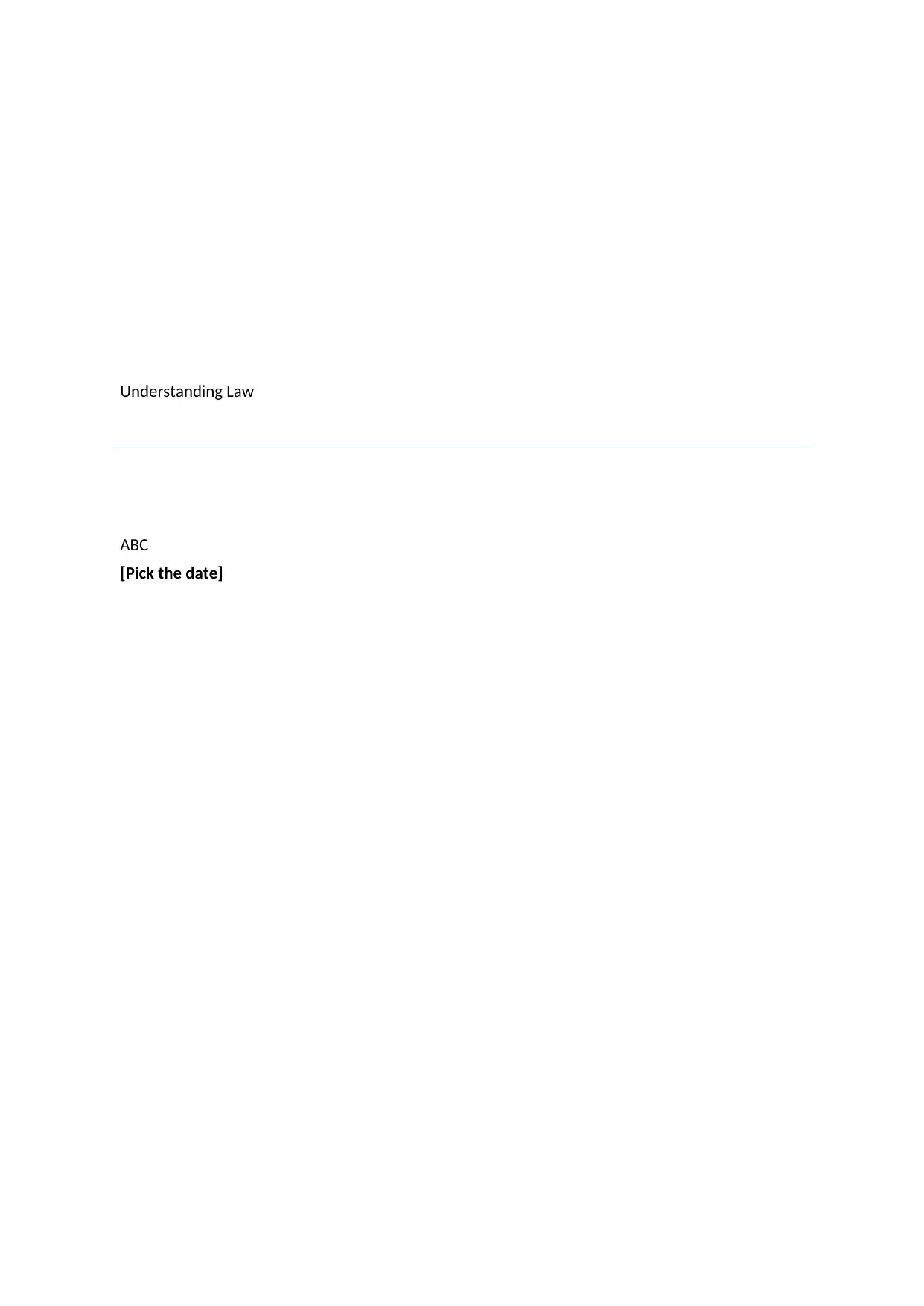
Understanding Law
ABC
[Pick the date]
ABC
[Pick the date]
Paraphrase This Document
Need a fresh take? Get an instant paraphrase of this document with our AI Paraphraser
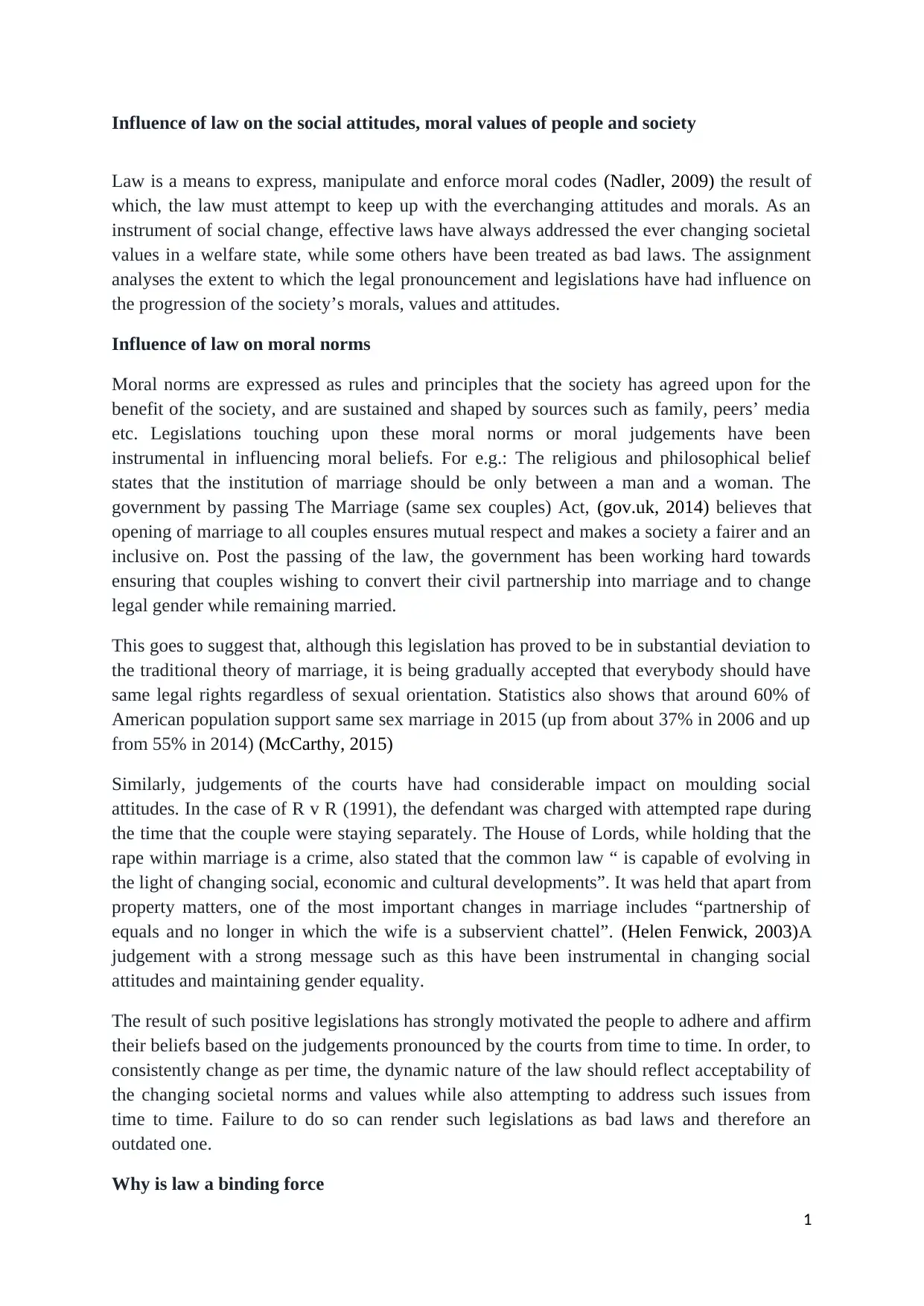
Influence of law on the social attitudes, moral values of people and society
Law is a means to express, manipulate and enforce moral codes (Nadler, 2009) the result of
which, the law must attempt to keep up with the everchanging attitudes and morals. As an
instrument of social change, effective laws have always addressed the ever changing societal
values in a welfare state, while some others have been treated as bad laws. The assignment
analyses the extent to which the legal pronouncement and legislations have had influence on
the progression of the society’s morals, values and attitudes.
Influence of law on moral norms
Moral norms are expressed as rules and principles that the society has agreed upon for the
benefit of the society, and are sustained and shaped by sources such as family, peers’ media
etc. Legislations touching upon these moral norms or moral judgements have been
instrumental in influencing moral beliefs. For e.g.: The religious and philosophical belief
states that the institution of marriage should be only between a man and a woman. The
government by passing The Marriage (same sex couples) Act, (gov.uk, 2014) believes that
opening of marriage to all couples ensures mutual respect and makes a society a fairer and an
inclusive on. Post the passing of the law, the government has been working hard towards
ensuring that couples wishing to convert their civil partnership into marriage and to change
legal gender while remaining married.
This goes to suggest that, although this legislation has proved to be in substantial deviation to
the traditional theory of marriage, it is being gradually accepted that everybody should have
same legal rights regardless of sexual orientation. Statistics also shows that around 60% of
American population support same sex marriage in 2015 (up from about 37% in 2006 and up
from 55% in 2014) (McCarthy, 2015)
Similarly, judgements of the courts have had considerable impact on moulding social
attitudes. In the case of R v R (1991), the defendant was charged with attempted rape during
the time that the couple were staying separately. The House of Lords, while holding that the
rape within marriage is a crime, also stated that the common law “ is capable of evolving in
the light of changing social, economic and cultural developments”. It was held that apart from
property matters, one of the most important changes in marriage includes “partnership of
equals and no longer in which the wife is a subservient chattel”. (Helen Fenwick, 2003)A
judgement with a strong message such as this have been instrumental in changing social
attitudes and maintaining gender equality.
The result of such positive legislations has strongly motivated the people to adhere and affirm
their beliefs based on the judgements pronounced by the courts from time to time. In order, to
consistently change as per time, the dynamic nature of the law should reflect acceptability of
the changing societal norms and values while also attempting to address such issues from
time to time. Failure to do so can render such legislations as bad laws and therefore an
outdated one.
Why is law a binding force
1
Law is a means to express, manipulate and enforce moral codes (Nadler, 2009) the result of
which, the law must attempt to keep up with the everchanging attitudes and morals. As an
instrument of social change, effective laws have always addressed the ever changing societal
values in a welfare state, while some others have been treated as bad laws. The assignment
analyses the extent to which the legal pronouncement and legislations have had influence on
the progression of the society’s morals, values and attitudes.
Influence of law on moral norms
Moral norms are expressed as rules and principles that the society has agreed upon for the
benefit of the society, and are sustained and shaped by sources such as family, peers’ media
etc. Legislations touching upon these moral norms or moral judgements have been
instrumental in influencing moral beliefs. For e.g.: The religious and philosophical belief
states that the institution of marriage should be only between a man and a woman. The
government by passing The Marriage (same sex couples) Act, (gov.uk, 2014) believes that
opening of marriage to all couples ensures mutual respect and makes a society a fairer and an
inclusive on. Post the passing of the law, the government has been working hard towards
ensuring that couples wishing to convert their civil partnership into marriage and to change
legal gender while remaining married.
This goes to suggest that, although this legislation has proved to be in substantial deviation to
the traditional theory of marriage, it is being gradually accepted that everybody should have
same legal rights regardless of sexual orientation. Statistics also shows that around 60% of
American population support same sex marriage in 2015 (up from about 37% in 2006 and up
from 55% in 2014) (McCarthy, 2015)
Similarly, judgements of the courts have had considerable impact on moulding social
attitudes. In the case of R v R (1991), the defendant was charged with attempted rape during
the time that the couple were staying separately. The House of Lords, while holding that the
rape within marriage is a crime, also stated that the common law “ is capable of evolving in
the light of changing social, economic and cultural developments”. It was held that apart from
property matters, one of the most important changes in marriage includes “partnership of
equals and no longer in which the wife is a subservient chattel”. (Helen Fenwick, 2003)A
judgement with a strong message such as this have been instrumental in changing social
attitudes and maintaining gender equality.
The result of such positive legislations has strongly motivated the people to adhere and affirm
their beliefs based on the judgements pronounced by the courts from time to time. In order, to
consistently change as per time, the dynamic nature of the law should reflect acceptability of
the changing societal norms and values while also attempting to address such issues from
time to time. Failure to do so can render such legislations as bad laws and therefore an
outdated one.
Why is law a binding force
1
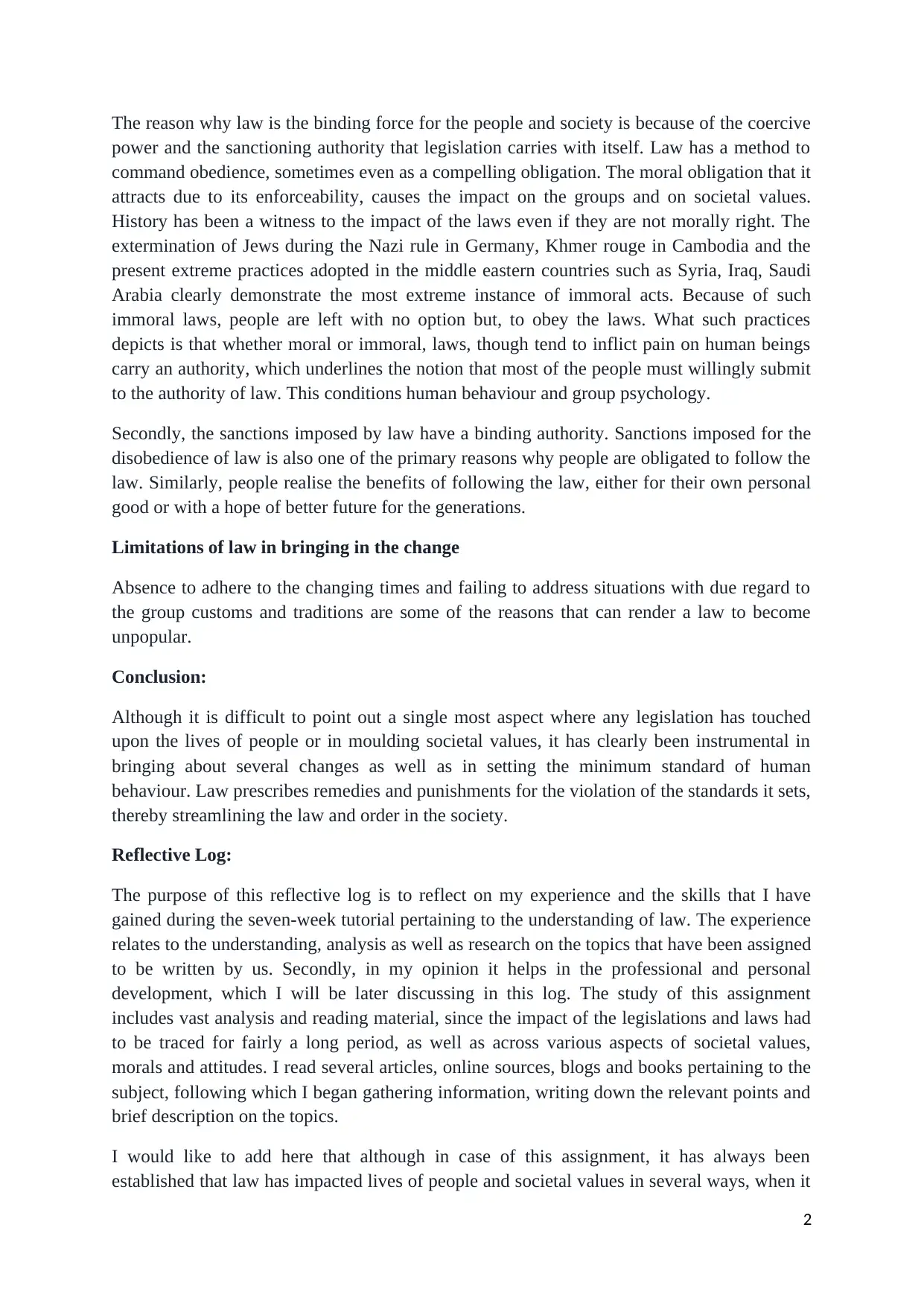
The reason why law is the binding force for the people and society is because of the coercive
power and the sanctioning authority that legislation carries with itself. Law has a method to
command obedience, sometimes even as a compelling obligation. The moral obligation that it
attracts due to its enforceability, causes the impact on the groups and on societal values.
History has been a witness to the impact of the laws even if they are not morally right. The
extermination of Jews during the Nazi rule in Germany, Khmer rouge in Cambodia and the
present extreme practices adopted in the middle eastern countries such as Syria, Iraq, Saudi
Arabia clearly demonstrate the most extreme instance of immoral acts. Because of such
immoral laws, people are left with no option but, to obey the laws. What such practices
depicts is that whether moral or immoral, laws, though tend to inflict pain on human beings
carry an authority, which underlines the notion that most of the people must willingly submit
to the authority of law. This conditions human behaviour and group psychology.
Secondly, the sanctions imposed by law have a binding authority. Sanctions imposed for the
disobedience of law is also one of the primary reasons why people are obligated to follow the
law. Similarly, people realise the benefits of following the law, either for their own personal
good or with a hope of better future for the generations.
Limitations of law in bringing in the change
Absence to adhere to the changing times and failing to address situations with due regard to
the group customs and traditions are some of the reasons that can render a law to become
unpopular.
Conclusion:
Although it is difficult to point out a single most aspect where any legislation has touched
upon the lives of people or in moulding societal values, it has clearly been instrumental in
bringing about several changes as well as in setting the minimum standard of human
behaviour. Law prescribes remedies and punishments for the violation of the standards it sets,
thereby streamlining the law and order in the society.
Reflective Log:
The purpose of this reflective log is to reflect on my experience and the skills that I have
gained during the seven-week tutorial pertaining to the understanding of law. The experience
relates to the understanding, analysis as well as research on the topics that have been assigned
to be written by us. Secondly, in my opinion it helps in the professional and personal
development, which I will be later discussing in this log. The study of this assignment
includes vast analysis and reading material, since the impact of the legislations and laws had
to be traced for fairly a long period, as well as across various aspects of societal values,
morals and attitudes. I read several articles, online sources, blogs and books pertaining to the
subject, following which I began gathering information, writing down the relevant points and
brief description on the topics.
I would like to add here that although in case of this assignment, it has always been
established that law has impacted lives of people and societal values in several ways, when it
2
power and the sanctioning authority that legislation carries with itself. Law has a method to
command obedience, sometimes even as a compelling obligation. The moral obligation that it
attracts due to its enforceability, causes the impact on the groups and on societal values.
History has been a witness to the impact of the laws even if they are not morally right. The
extermination of Jews during the Nazi rule in Germany, Khmer rouge in Cambodia and the
present extreme practices adopted in the middle eastern countries such as Syria, Iraq, Saudi
Arabia clearly demonstrate the most extreme instance of immoral acts. Because of such
immoral laws, people are left with no option but, to obey the laws. What such practices
depicts is that whether moral or immoral, laws, though tend to inflict pain on human beings
carry an authority, which underlines the notion that most of the people must willingly submit
to the authority of law. This conditions human behaviour and group psychology.
Secondly, the sanctions imposed by law have a binding authority. Sanctions imposed for the
disobedience of law is also one of the primary reasons why people are obligated to follow the
law. Similarly, people realise the benefits of following the law, either for their own personal
good or with a hope of better future for the generations.
Limitations of law in bringing in the change
Absence to adhere to the changing times and failing to address situations with due regard to
the group customs and traditions are some of the reasons that can render a law to become
unpopular.
Conclusion:
Although it is difficult to point out a single most aspect where any legislation has touched
upon the lives of people or in moulding societal values, it has clearly been instrumental in
bringing about several changes as well as in setting the minimum standard of human
behaviour. Law prescribes remedies and punishments for the violation of the standards it sets,
thereby streamlining the law and order in the society.
Reflective Log:
The purpose of this reflective log is to reflect on my experience and the skills that I have
gained during the seven-week tutorial pertaining to the understanding of law. The experience
relates to the understanding, analysis as well as research on the topics that have been assigned
to be written by us. Secondly, in my opinion it helps in the professional and personal
development, which I will be later discussing in this log. The study of this assignment
includes vast analysis and reading material, since the impact of the legislations and laws had
to be traced for fairly a long period, as well as across various aspects of societal values,
morals and attitudes. I read several articles, online sources, blogs and books pertaining to the
subject, following which I began gathering information, writing down the relevant points and
brief description on the topics.
I would like to add here that although in case of this assignment, it has always been
established that law has impacted lives of people and societal values in several ways, when it
2
⊘ This is a preview!⊘
Do you want full access?
Subscribe today to unlock all pages.

Trusted by 1+ million students worldwide
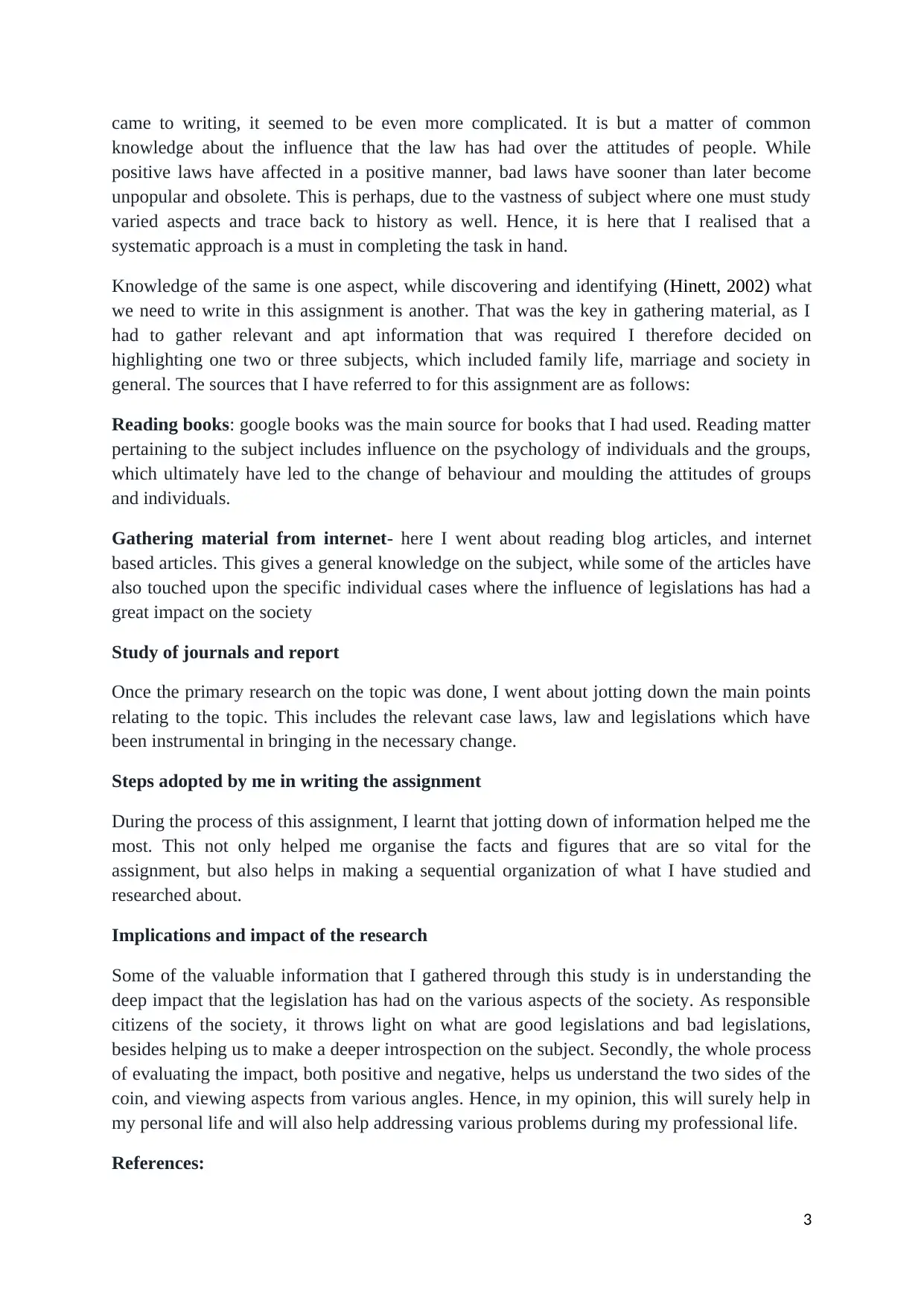
came to writing, it seemed to be even more complicated. It is but a matter of common
knowledge about the influence that the law has had over the attitudes of people. While
positive laws have affected in a positive manner, bad laws have sooner than later become
unpopular and obsolete. This is perhaps, due to the vastness of subject where one must study
varied aspects and trace back to history as well. Hence, it is here that I realised that a
systematic approach is a must in completing the task in hand.
Knowledge of the same is one aspect, while discovering and identifying (Hinett, 2002) what
we need to write in this assignment is another. That was the key in gathering material, as I
had to gather relevant and apt information that was required I therefore decided on
highlighting one two or three subjects, which included family life, marriage and society in
general. The sources that I have referred to for this assignment are as follows:
Reading books: google books was the main source for books that I had used. Reading matter
pertaining to the subject includes influence on the psychology of individuals and the groups,
which ultimately have led to the change of behaviour and moulding the attitudes of groups
and individuals.
Gathering material from internet- here I went about reading blog articles, and internet
based articles. This gives a general knowledge on the subject, while some of the articles have
also touched upon the specific individual cases where the influence of legislations has had a
great impact on the society
Study of journals and report
Once the primary research on the topic was done, I went about jotting down the main points
relating to the topic. This includes the relevant case laws, law and legislations which have
been instrumental in bringing in the necessary change.
Steps adopted by me in writing the assignment
During the process of this assignment, I learnt that jotting down of information helped me the
most. This not only helped me organise the facts and figures that are so vital for the
assignment, but also helps in making a sequential organization of what I have studied and
researched about.
Implications and impact of the research
Some of the valuable information that I gathered through this study is in understanding the
deep impact that the legislation has had on the various aspects of the society. As responsible
citizens of the society, it throws light on what are good legislations and bad legislations,
besides helping us to make a deeper introspection on the subject. Secondly, the whole process
of evaluating the impact, both positive and negative, helps us understand the two sides of the
coin, and viewing aspects from various angles. Hence, in my opinion, this will surely help in
my personal life and will also help addressing various problems during my professional life.
References:
3
knowledge about the influence that the law has had over the attitudes of people. While
positive laws have affected in a positive manner, bad laws have sooner than later become
unpopular and obsolete. This is perhaps, due to the vastness of subject where one must study
varied aspects and trace back to history as well. Hence, it is here that I realised that a
systematic approach is a must in completing the task in hand.
Knowledge of the same is one aspect, while discovering and identifying (Hinett, 2002) what
we need to write in this assignment is another. That was the key in gathering material, as I
had to gather relevant and apt information that was required I therefore decided on
highlighting one two or three subjects, which included family life, marriage and society in
general. The sources that I have referred to for this assignment are as follows:
Reading books: google books was the main source for books that I had used. Reading matter
pertaining to the subject includes influence on the psychology of individuals and the groups,
which ultimately have led to the change of behaviour and moulding the attitudes of groups
and individuals.
Gathering material from internet- here I went about reading blog articles, and internet
based articles. This gives a general knowledge on the subject, while some of the articles have
also touched upon the specific individual cases where the influence of legislations has had a
great impact on the society
Study of journals and report
Once the primary research on the topic was done, I went about jotting down the main points
relating to the topic. This includes the relevant case laws, law and legislations which have
been instrumental in bringing in the necessary change.
Steps adopted by me in writing the assignment
During the process of this assignment, I learnt that jotting down of information helped me the
most. This not only helped me organise the facts and figures that are so vital for the
assignment, but also helps in making a sequential organization of what I have studied and
researched about.
Implications and impact of the research
Some of the valuable information that I gathered through this study is in understanding the
deep impact that the legislation has had on the various aspects of the society. As responsible
citizens of the society, it throws light on what are good legislations and bad legislations,
besides helping us to make a deeper introspection on the subject. Secondly, the whole process
of evaluating the impact, both positive and negative, helps us understand the two sides of the
coin, and viewing aspects from various angles. Hence, in my opinion, this will surely help in
my personal life and will also help addressing various problems during my professional life.
References:
3
Paraphrase This Document
Need a fresh take? Get an instant paraphrase of this document with our AI Paraphraser
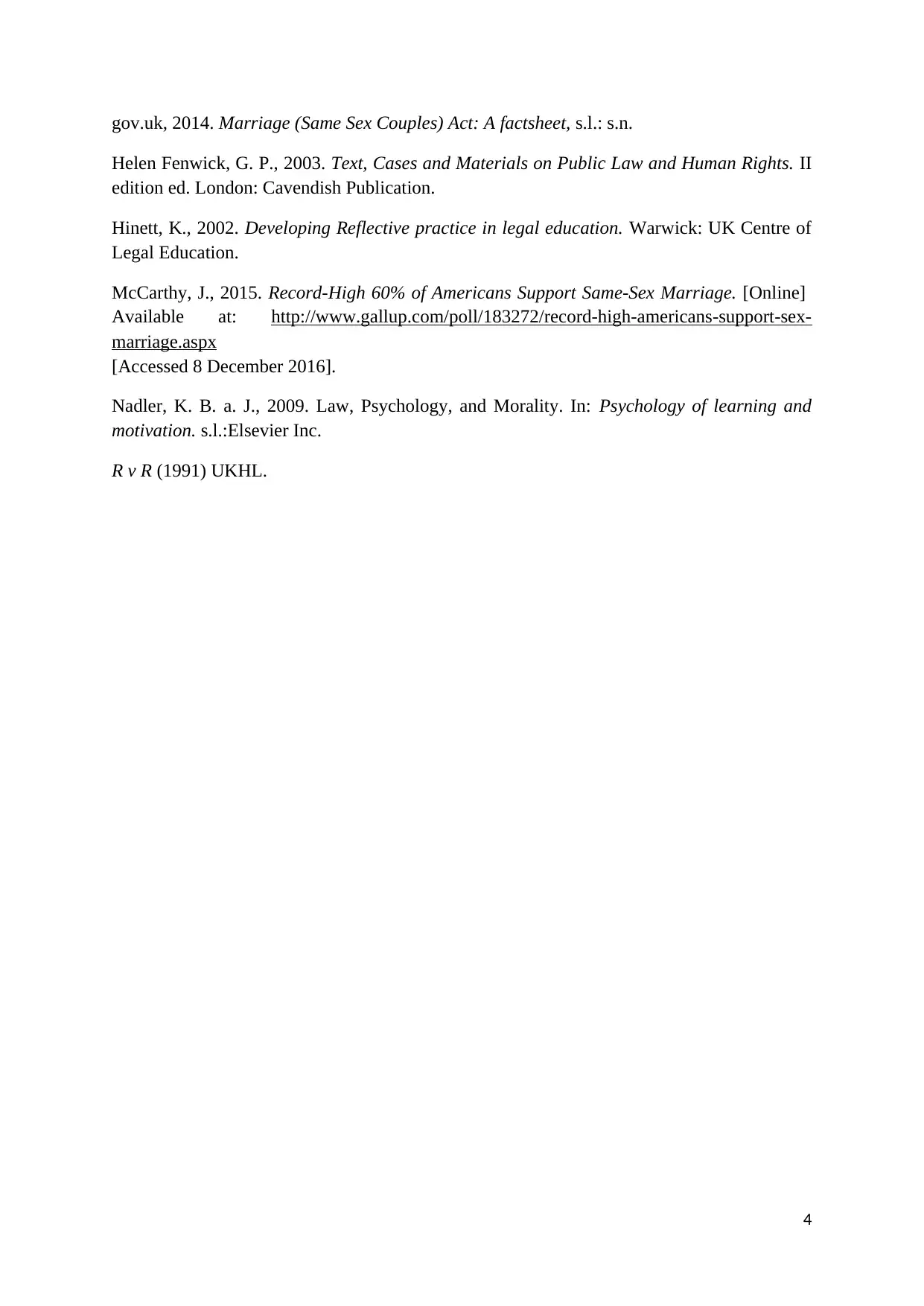
gov.uk, 2014. Marriage (Same Sex Couples) Act: A factsheet, s.l.: s.n.
Helen Fenwick, G. P., 2003. Text, Cases and Materials on Public Law and Human Rights. II
edition ed. London: Cavendish Publication.
Hinett, K., 2002. Developing Reflective practice in legal education. Warwick: UK Centre of
Legal Education.
McCarthy, J., 2015. Record-High 60% of Americans Support Same-Sex Marriage. [Online]
Available at: http://www.gallup.com/poll/183272/record-high-americans-support-sex-
marriage.aspx
[Accessed 8 December 2016].
Nadler, K. B. a. J., 2009. Law, Psychology, and Morality. In: Psychology of learning and
motivation. s.l.:Elsevier Inc.
R v R (1991) UKHL.
4
Helen Fenwick, G. P., 2003. Text, Cases and Materials on Public Law and Human Rights. II
edition ed. London: Cavendish Publication.
Hinett, K., 2002. Developing Reflective practice in legal education. Warwick: UK Centre of
Legal Education.
McCarthy, J., 2015. Record-High 60% of Americans Support Same-Sex Marriage. [Online]
Available at: http://www.gallup.com/poll/183272/record-high-americans-support-sex-
marriage.aspx
[Accessed 8 December 2016].
Nadler, K. B. a. J., 2009. Law, Psychology, and Morality. In: Psychology of learning and
motivation. s.l.:Elsevier Inc.
R v R (1991) UKHL.
4
1 out of 5
Related Documents
Your All-in-One AI-Powered Toolkit for Academic Success.
+13062052269
info@desklib.com
Available 24*7 on WhatsApp / Email
![[object Object]](/_next/static/media/star-bottom.7253800d.svg)
Unlock your academic potential
Copyright © 2020–2025 A2Z Services. All Rights Reserved. Developed and managed by ZUCOL.





